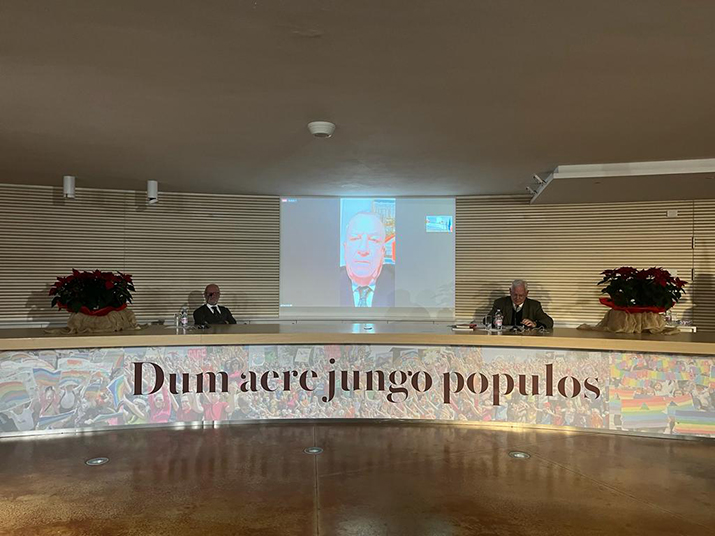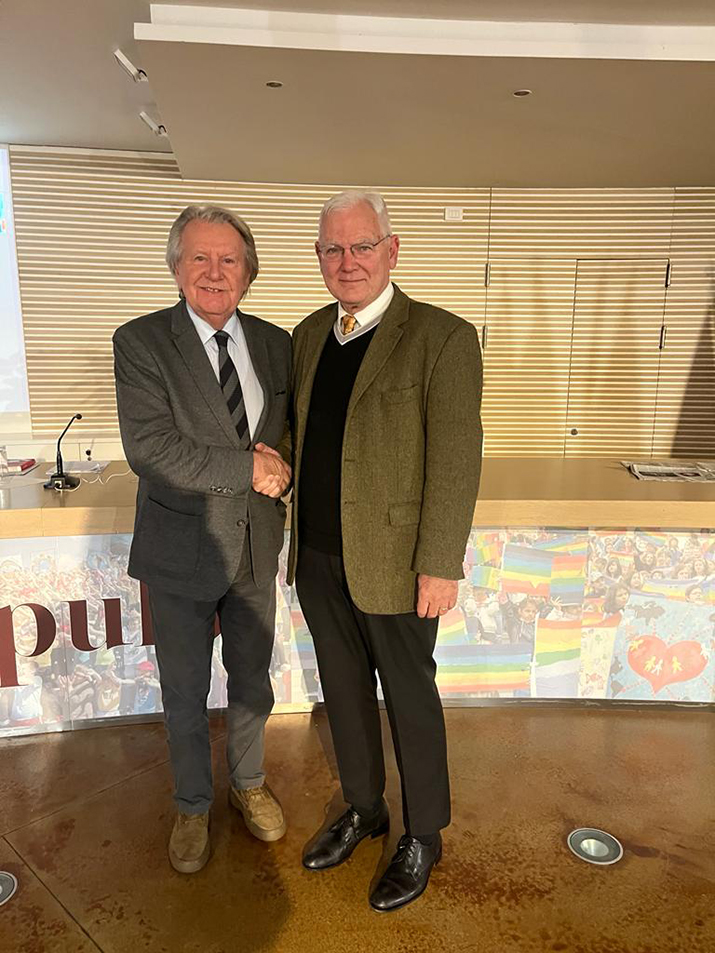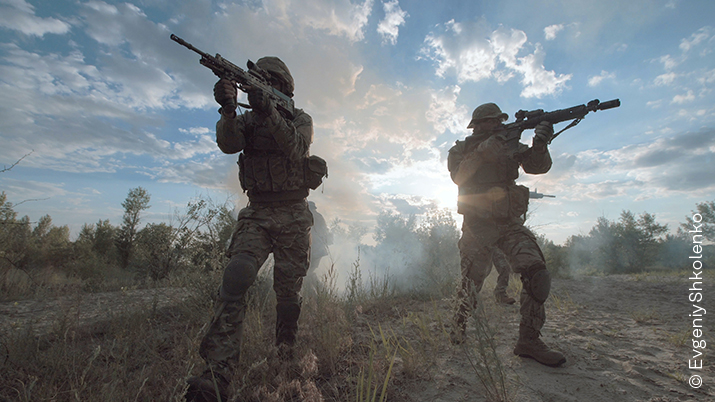ALLEN LYNCH’S LECTURE ON THE WAR IN UKRAINE
Last December 5th at Colle di Miravalle, the ‘Trentini nel Mondo’ Association and the Rovereto Peace Bell Foundation organized a conference on the question «War in Ukraine and the Middle East: is the world in danger? ». The meeting was moderated by the journalist and director of the «Atlas of Wars and Conflicts in the World» Raffaele Crocco. Following the intervention of the Foundation President, Marco Marsilli, and the introduction from the president of the ‘Trentini nel Mondo’, Armando Maistri, the current geopolitical situation was analysed by Allen Charles Lynch, Professor Emeritus in political science at Virginia University (USA) and Associate Professor at Luiss. Below we propose excerpts from his report.
More than twenty months have passed since the beginning of the conflict between Russia and Ukraine, which in actual fact has also become a proxy war between Moscow and what Putin calls "the collective West". Twenty months after the outbreak of World War I, all the great European powers, including the Ottoman Empire, were intact. The United States had yet to enter the war. The Germans, together with Austria-Hungary and Ottoman Turkey, sought to establish their hegemony in Europe by defeating Russia and France; the French, along with the English and Russians, sought to reclaim Alsace-Lorraine and, in the process, forever destroy Germany's ability to threaten France; the Russians wanted to expand once again at the expense of the Ottomans and claimed Constantinople; the Italians, together with the French, English and Russians, tried to annex the unredeemed lands in Trentino, Alto Adige and along the Adriatic; the Americans, under the presidency of Woodrow Wilson, wished to mediate a "peace without victory".
We all know how the story ended: rather than “peace without victory”, there was “victory without peace”. Two and a half years later Germany had not accepted the legitimacy of the defeat; the Austro-Hungarian, Russian, and Ottoman empires were disintegrating; the French and English paid a terrible price for their “victory,” so much so that the beginning of the end of their empires can be dated to November 1918; an Italy penalized at the conference table saw a wave of militant nationalism that cannot be separated from the triumph of fascism in 1922; the American people soundly rejected President Wilson's plan for a League of Nations in the 1920 national elections, resulting in a fateful U.S. withdrawal from European security matters.
If European leaders had known all this in June 1916, what price would they have paid to avoid a similar fate? But they didn't know it and, instead of acknowledging their ignorance and putting an end to the war, they bet everything on "plan A" for there was no “plan B”.
Let's take a second example: the Korean War. After 11 months of brutal fighting, the lines stabilized very close to the pre-war border, the thirty-eighth parallel. But the war, which became a proxy war between the Soviet Union and Communist China, on the one hand, and the United States and its allies, on the other, continued for more than two years, during which the lines practically remained the same. How many of the more than 1.2 million deaths in combat could have been avoided if the war had ended two years earlier? How many of the more than 1 million civilian casualties in North and South Korea could have been avoided?
The armistice that ended the Korean War was not a peace treaty and left all parties far from their ultimate goals. But who would say today that an indefinite continuation of that war would have been preferable to the highly imperfect peace that has prevailed on the Korean Peninsula since July 1953?
Russia and Ukraine find themselves in positions similar to those of the European leaders in June 1916 and the "principles" of the Cold War in June 1951: no one has achieved the results they aimed for and the prospects of achieving them in the near future appear remote. Nonetheless, both Moscow and Kiev and its allies remain engaged in a war aimed at achieving the highest objectives: for Moscow, to conquer and hold as much of Ukraine as possible in the hope of eventually triggering a regime change in the neighbouring country. For Kiev, expel Moscow's soldiers from all territory, including the Crimean Peninsula.
If we take the leaders in Kiev at their word, anything less than the complete expulsion of Russian troops from all of Ukraine would be a defeat. However, the initial Russian war plan which involved the occupation of the enemy capital has already failed. So, one could say that Kiev has achieved an important victory. Furthermore, the Ukrainian army managed to force the Russians to withdraw the fleet from Crimea. This grants Ukraine the ability to export grain and other products from Odessa to the world. But how long will the country be able to tolerate the high number of deaths in combat, which among other things remains a state secret?
And what could be an acceptable victory for Russia? Putin may think back to the experience of his grandfather Spiridon, who became Vladimir Lenin's personal chef. Putin's grandfather, whom the current president knew until the age of thirteen, witnessed the collapse of the Russian army in 1917. This was the trigger for the subsequent communist takeover, the disintegration of the empire and the civil war that consumed Russia between 1918 and 1920. Simply put, the authorities in Moscow continued to wage a war that they could not win, could not finance and could not logistically administer leading to disaster.
Returning to the present, consider that both Kiev and Moscow have their own “narratives” supporting the war. For Kiev and its Western supporters, Ukraine is the David attacked by the Russian Goliath. According to Moscow, however, it is the Russian David that is being attacked, through a proxy war, by the "collective West".
In my opinion, Russia will never accept a "defeat" in Ukraine. So, instead of re-examining the course of politics that led to the debacle, Moscow would blame the West for its fate and try, like Germany after 1918, to react as soon as possible.
Likewise, the Zelensky government cannot accept anything less than total victory without committing political suicide. And the president seems "hostage" to the most radical wing of Ukrainian ethno-nationalists, whose power has understandably increased over the course of the war.
In short, we are faced with the prospect of a conflict of indefinite duration. Hatred has accumulated that will last generations. And what's worse, too often the parties seem to believe that not only defeat, but the "disappearance" of the other is the minimum condition for an acceptable peace.
As is also happening in the Israeli-Palestinian conflict, we are faced with the prospect of a conflict with unattainable objectives, which will transform the foreign and domestic policies of all the countries involved, including Ukraine's allies.
However, there are a number of diplomatic tools that could be used to end this war, with the understanding that an agreement must be negotiated in good faith.
First, Russia and Ukraine must agree to an immediate, comprehensive and indefinite ceasefire pending the withdrawal of Moscow's troops. Ukrainian soldiers would remain in place. The temporary ceasefire line may be patrolled and monitored by UN observers.
The agreement could incorporate the following elements:
- Ukraine accepts whatever status voters in Crimea and the East want, on the condition that elections are held under UN supervision.
- Ukraine and Russia agree on a demilitarized zone of approximately 100 kilometres along each side of the border.
- Ukraine accepts neutrality as long as Russia respects the conditions of the demilitarized zone.
- US and NATO agree not to deploy certain classes of attack weapons in Ukraine.
- Once Russian troops withdraw from Ukraine, the West and Russia will lift all economic and financial sanctions in place since Russia's annexation of Crimea in 2014.
- In the meantime, United Nations observers will be sent to monitor humanitarian channels.
- There will be UN funding for reconstruction in Ukraine.
In the absence of the political will of Russia, Ukraine and the United States to explore these terms of solution, the prospect is that of an indefinite proxy war between Russia and NATO during which Ukraine would be progressively destroyed, while the Atlantic Alliance and Moscow would maintain a significant risk of escalation of the conflict, to the point of direct war. In this case, Europe would perpetually have a new conflict on its borders along the Arab Israeli model.

A moment from the conference

Professor Allen Charles Lynch with the Vice-President of the Foundation, Lorenzo Saiani







